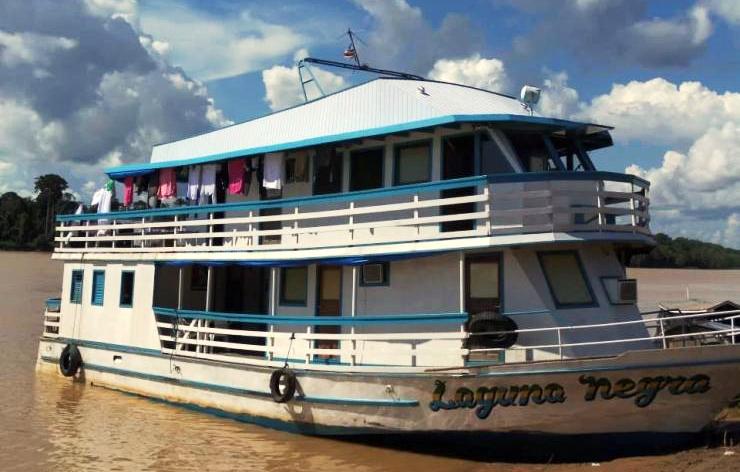In the Prelacy of Labrea, in the state of Amazonas, the Laguna Negra hospital boat, in collaboration with the Epifania Community, serves to announce the Gospel and improve the health conditions and quality of life of the indigenous and riverine population.
In 2006, the Epifania Community began a mission in the Prelature of Labrea, sending four missionaries to help with pastoral training in the Parish of St. John the Baptist in the Municipality of Canutama. Working with the population on the banks of the Purus River, a tributary of the Amazon, immediately presented itself as a great challenge. But one of the missionaries’ greatest concerns is the health situation.
Municipal centres have small clinics that function without any structure. It is not unusual to witness people dying from snake bites due to a lack of serum. Tropical diseases, which are widespread during floods and ebb tides, cause damage, especially to children.
In January 2007, faced with this challenge, the community decided to launch a project aimed specifically at the riverine and indigenous population, using a hospital boat that would travel along the Purus River, to provide medical and dental assistance to these populations.
The project concerns the four municipalities that make up the Prelature: Labrea, Canutama, Tapauá and Pauini, located in the central-southwestern region of the State of Amazonas.
The boat is owned by the Prelature of Labrea and has two medical offices, a dental surgery, three cabins with beds; a kitchen with a stove, cabinets and a bread maker, as well as other staff amenities.
During the mission voyage, daily services begin at 8.00 am and end at 5.00 pm. At the start or end of each day, there are prayers or Mass presided over by the priests who accompany the journey.
Various activities are carried out: medical visits with clinical examinations, blood pressure measurement, the administration and supply of drugs; dental care (extractions, fillings, prophylaxis, consultations and preventive discussions on oral hygiene), medications and urgent care with the administration of intravenous and intramuscular drugs; home visits with medical assistance for the elderly and bedridden, in addition to spiritual support provided by priests.
Eliana Machado, missionary of the Epiphany Community, said “In 2023 we carried out around six thousand visits to the coastal populations and indigenous communities, in addition to missionary visits, pastoral activities and Eucharistic celebrations. Our desire is always to bring hope, charity and love to our brothers and sisters along the river. Every year we count on medical volunteers who carry out this mission together with the Church.”
An interesting aspect of this project is the involvement of volunteers who come every year to provide their service to the indigenous and riverine communities.
Monsignor Santiago Sánchez Sebastian, bishop of the Lábrea Prelature, emphasizes that this project is part of a larger project called the ‘Sister Church Project’.
The bishop said “The Sister Church Project was created by the CNBB – National Conference of Brazilian Bishops – at the end of 1972. The objective was to share faith, gifts of grace, pastoral experiences, people and financial resources as gestures of Christian charity towards the Churches of the ‘Amazon.”
At the beginning of 1972, the archdiocese of Vitória, in the state of the Holy Spirit took charge of the project with the Prelature of Labrea. The bishop continued: “The missionary projects developed in the Amazon with the support of the sister Churches are a sign, a reminder and a stimulus for the entire Brazilian Church to be truly missionary, ‘in a permanent state of mission’”.
The Prelature of Labrea was created on 05.01.1925, with the Bull “Imperscrutabili Dei consilio” of Pope Pius XI. It was entrusted by the Holy See to the care of the Order of Augustinian Recollects.
Today, the Prelature is made up of five parishes, with 16 priests serving more than 74,000 people in an area of 68.262 km². Last February, Thiago Mendes Alves, the first priest of the Prelature, was ordained, marking a significant chapter in the ecclesial journey of the region. (Bernardino Frutuoso)






